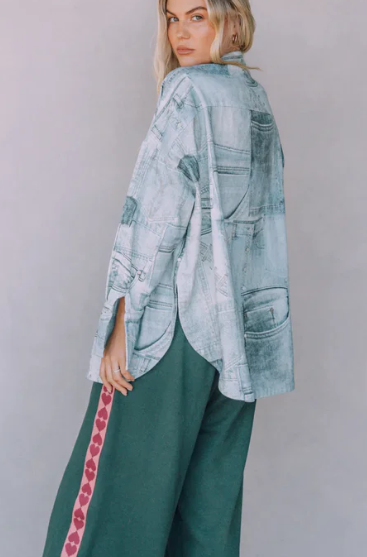Sustainable fashion is more than just a trend; it’s a movement towards creating a more ethical and environmentally friendly approach to clothing production and consumption. With growing awareness about the environmental impact of the fashion industry, consumers and designers alike are looking for ways to reduce their carbon footprint. Sustainable fashion focuses on using eco-friendly textiles, reducing waste, and promoting ethical labor practices. This article will explore the various types of eco-friendly textiles and how they contribute to sustainable fashion.
The Environmental Impact of Conventional Textiles
The traditional textile industry is known for its significant environmental impact. From water pollution caused by dyeing processes to the extensive use of non-renewable resources, conventional textiles pose numerous environmental challenges. The production of synthetic fibers, such as polyester, requires large amounts of energy and releases harmful emissions. Additionally, the widespread use of pesticides and fertilizers in cotton farming further exacerbates environmental degradation. By shifting towards sustainable textiles, the fashion industry can mitigate these adverse effects and pave the way for a greener future.
The Rise of Organic Cotton
One of the most popular eco-friendly textiles is organic cotton. Unlike conventional cotton, organic cotton is grown without the use of synthetic pesticides and fertilizers, making it a more sustainable choice. The cultivation of organic cotton promotes soil health and reduces water consumption. Additionally, organic cotton farmers often follow fair trade practices, ensuring better working conditions and wages for workers. For those looking to make a positive impact with their fashion choices, opting Cool round neck Tshirts for mens made from organic cotton is a great start.
The Benefits of Hemp Fabric
Hemp is another sustainable textile gaining popularity in the fashion industry. Known for its durability and versatility, hemp requires minimal water and no synthetic fertilizers or pesticides to grow. Hemp plants also help improve soil health by replenishing vital nutrients. The resulting fabric is strong, breathable, and naturally resistant to mold and UV rays. Incorporating hemp into fashion not only supports sustainable agriculture but also offers consumers high-quality, long-lasting clothing options.
The Versatility of Bamboo
Bamboo is a rapidly renewable resource that has become a favorite in sustainable fashion circles. Bamboo grows quickly without the need for pesticides or excessive water, making it an eco-friendly choice. Bamboo fibers can be spun into soft, breathable, and moisture-wicking fabrics, ideal for a variety of clothing items. From activewear to Cute graphic printed Tshirts, bamboo textiles provide a sustainable alternative to conventional materials while offering comfort and style.
The Innovation of Recycled Textiles
Recycled textiles represent a significant advancement in sustainable fashion. These textiles are made from post-consumer waste, such as plastic bottles and discarded clothing. By recycling materials that would otherwise end up in landfills, the fashion industry can reduce waste and lower its environmental footprint. Recycled polyester, for instance, retains the durability and versatility of virgin polyester but with a much smaller environmental impact. Choosing clothing made from recycled textiles is a proactive way to support sustainability and minimize waste.
The Promise of Tencel and Lyocell
Tencel and Lyocell are biodegradable fibers derived from sustainably sourced wood pulp, primarily from eucalyptus, beech, and spruce trees. The production process for these fibers uses closed-loop systems that recycle water and solvents, reducing environmental harm. Tencel and Lyocell fabrics are soft, breathable, and highly absorbent, making them perfect for a variety of fashion applications. Their eco-friendly production and biodegradability make them excellent choices for those committed to sustainable fashion.
Enhance SEO with powerful bulk spam score checker and fast approval for niche-specific placements to boost your online presence.
Ethical Considerations in Sustainable Fashion
Sustainable fashion extends beyond eco-friendly textiles to encompass ethical labor practices. The fashion industry has long been criticized for exploitative labor conditions, particularly in developing countries. Sustainable fashion brands prioritize fair wages, safe working conditions, and transparency throughout their supply chains. By supporting these brands, consumers can contribute to a more equitable and just fashion industry.
Making Sustainable Fashion Choices
Consumers play a crucial role in driving the sustainable fashion movement. By choosing clothing made from eco-friendly textiles and supporting brands that prioritize sustainability, individuals can help reduce the environmental and social impacts of the fashion industry. Educating oneself about the different types of sustainable textiles and their benefits is a key step towards making informed and responsible fashion choices.
Conclusion
Sustainable fashion represents a meaningful shift towards a more ethical and environmentally friendly industry. From organic cotton and hemp to bamboo and recycled textiles, eco-friendly materials offer numerous benefits for both the planet and consumers. By embracing sustainable fashion, we can collectively work towards a greener and more sustainable future. For more insights into sustainable practices and products, visit theblissfulstudio.com.






